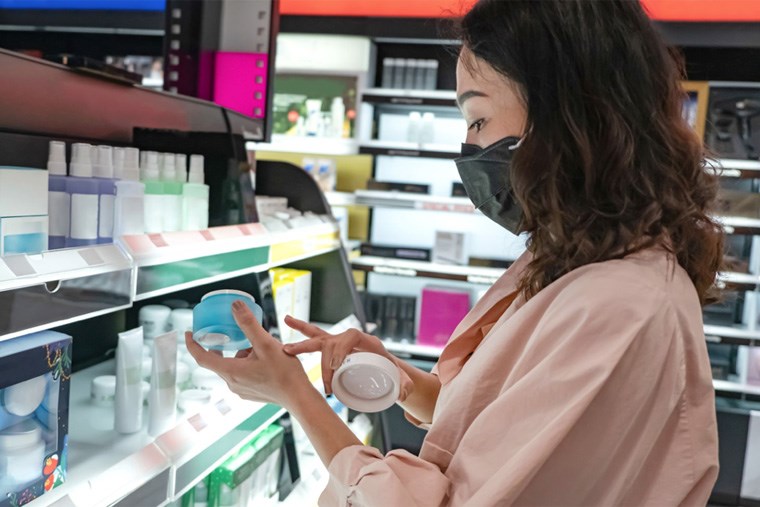Developing a skincare routine can be daunting with all of the products available, and navigating through the technical terms and buzzwords requires patience – and a new vocabulary! Here are the most popular skincare buzzwords you’ll encounter (along with their definitions) as you research new products.
Hyaluronic Acid
Hyaluronic acid increases skin hydration by binding with water molecules and attaching them to collagen in your skin cells. Aging, sun damage, and stress can all lead to decreased moisture retention and hydration in your skin, so using hyaluronic acid will help replenish what you’ve lost. Hydrated skin appears fuller, brighter, and even glowing, and it’s useful for all skin types.
Salicylic Acid
The most common beta-hydroxy acid (BHA), salicylic acid, is a chemical exfoliant – it removes dead skin cells and gently unclogs pores without harsh abrasion from scrubs or tools. Salicylic acid is most commonly used on oily and acne-prone skin to reduce blemishes and buildup. As with any acid, using this ingredient will make your skin more sensitive to the sun, so increased sunscreen usage is necessary.
Retinol
Made from vitamin A, retinol is a popular anti-aging and skin renewal ingredient. Because the retinol molecules are small, they travel below your outer layer of skin cells to trap harmful free radicals and encourage cell regeneration by creating elastin and collagen (two important skin building blocks). Your skin will look fuller, firmer, and brighter, especially with consistent long-term use.
Ceramides
Ceramides are fats found in high concentrations on the outer layer of your skin; these fats help keep moisture in, dirt and oils out, and give your skin a bright and full look. Aging, sun damage, and stress can all harm your natural ceramides, so skincare products with added ceramides help replenish your stock. One of the most effective anti-aging ingredients, ceramides, can be used on all skin types and in conjunction with many other skincare products.
Resveratrol
An antioxidant found in grapes, resveratrol is a molecule that can help activate the cells that combat aging and stop potentially dangerous free radicals from damaging your skin cells. Resveratrol has been shown to help protect against damage from UV rays and even stress. This ingredient can help prevent and repair signs of damage like redness, bumps, dullness, and uneven texture/tone. It’s useful for emergency and spot-treatments, but its real benefit is in long-term anti-aging cell protection.
 supersizer via gettyimages.com
supersizer via gettyimages.comSerum
Rather than being a particular ingredient, serums are a specific kind of skincare product – a delivery method for all of the essential ingredients. Serums are typically water-based (although oil-based are becoming more popular) and designed to deliver very concentrated amounts of ingredients to your skin. Because the water-based molecules are small, they can penetrate deeply. Serums are usually applied after cleansing but before moisturizing so that your creams can help lock in the serum underneath. Serums are often expensive due to their high potency, but they tend to last several months since you’re only using a small bit at a time.
Peptides
Peptides are compounds that, when used in skincare, send signals to your brain to produce more collagen - collagen, in turn, is one of the primary components of healthy skin cells. Using peptides can combat many age-related skincare needs: improving firmness, decreasing wrinkles, and brightening. Peptides can be found in creams, serums, and gels, so it’s important to find the best application for your skin.
Glycolic Acid
Part of the alpha-hydroxy acid (AHA) group (along with things like lactic acid and citric acid), glycolic acid is a popular skincare ingredient used in various products. It acts to separate surface-level skin cells without using harsh exfoliation, so you end up with faster cell regeneration and, therefore, fresher-looking skin. Glycolic acid can help reduce fine lines and wrinkles, stop acne from forming, and even skin tone. Using glycolic acid will also increase your sensitivity to the sun, so increase sunscreen use accordingly.
Non-Comedogenic
This term is a fancy way of saying that the product won’t block your pores. “Comedones” are the technical term for whiteheads and blackheads, so if a product is “non-comedogenic,” it means that it’s unlikely to create these blockages.
Hypoallergenic
When a product bears this label, the manufacturer claims that it’s less likely to cause allergic reactions or skin sensitivity issues than products without the designation. Generally, this means that the product is made with few (if any) allergens. However, since everyone’s skin is different and may be prone to reactions from a wide array of ingredients, the term “hypoallergenic” isn’t a guarantee that it’s safe for your own skin. Always test a small patch first.
Armed with this new vocabulary, you can choose a skincare routine that works best for you!
 This story was made possible by our Community Partners Program. Thank you Didsbury Dental for helping to expand local news coverage in Alberta. Learn more.
This story was made possible by our Community Partners Program. Thank you Didsbury Dental for helping to expand local news coverage in Alberta. Learn more.


